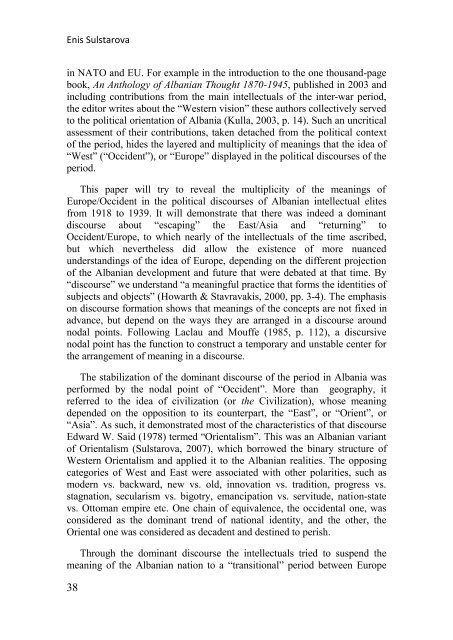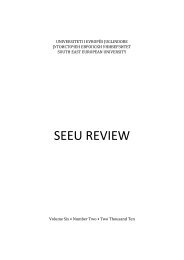SEEU Review vol. 5 Nr. 2 (pdf) - South East European University
SEEU Review vol. 5 Nr. 2 (pdf) - South East European University
SEEU Review vol. 5 Nr. 2 (pdf) - South East European University
Create successful ePaper yourself
Turn your PDF publications into a flip-book with our unique Google optimized e-Paper software.
Enis Sulstarova<br />
in NATO and EU. For example in the introduction to the one thousand-page<br />
book, An Anthology of Albanian Thought 1870-1945, published in 2003 and<br />
including contributions from the main intellectuals of the inter-war period,<br />
the editor writes about the “Western vision” these authors collectively served<br />
to the political orientation of Albania (Kulla, 2003, p. 14). Such an uncritical<br />
assessment of their contributions, taken detached from the political context<br />
of the period, hides the layered and multiplicity of meanings that the idea of<br />
“West” (“Occident”), or “Europe” displayed in the political discourses of the<br />
period.<br />
This paper will try to reveal the multiplicity of the meanings of<br />
Europe/Occident in the political discourses of Albanian intellectual elites<br />
from 1918 to 1939. It will demonstrate that there was indeed a dominant<br />
discourse about “escaping” the <strong>East</strong>/Asia and “returning” to<br />
Occident/Europe, to which nearly of the intellectuals of the time ascribed,<br />
but which nevertheless did allow the existence of more nuanced<br />
understandings of the idea of Europe, depending on the different projection<br />
of the Albanian development and future that were debated at that time. By<br />
“discourse” we understand “a meaningful practice that forms the identities of<br />
subjects and objects” (Howarth & Stavravakis, 2000, pp. 3-4). The emphasis<br />
on discourse formation shows that meanings of the concepts are not fixed in<br />
advance, but depend on the ways they are arranged in a discourse around<br />
nodal points. Following Laclau and Mouffe (1985, p. 112), a discursive<br />
nodal point has the function to construct a temporary and unstable center for<br />
the arrangement of meaning in a discourse.<br />
The stabilization of the dominant discourse of the period in Albania was<br />
performed by the nodal point of “Occident”. More than geography, it<br />
referred to the idea of civilization (or the Civilization), whose meaning<br />
depended on the opposition to its counterpart, the “<strong>East</strong>”, or “Orient”, or<br />
“Asia”. As such, it demonstrated most of the characteristics of that discourse<br />
Edward W. Said (1978) termed “Orientalism”. This was an Albanian variant<br />
of Orientalism (Sulstarova, 2007), which borrowed the binary structure of<br />
Western Orientalism and applied it to the Albanian realities. The opposing<br />
categories of West and <strong>East</strong> were associated with other polarities, such as<br />
modern vs. backward, new vs. old, innovation vs. tradition, progress vs.<br />
stagnation, secularism vs. bigotry, emancipation vs. servitude, nation-state<br />
vs. Ottoman empire etc. One chain of equivalence, the occidental one, was<br />
considered as the dominant trend of national identity, and the other, the<br />
Oriental one was considered as decadent and destined to perish.<br />
Through the dominant discourse the intellectuals tried to suspend the<br />
meaning of the Albanian nation to a “transitional” period between Europe<br />
38

















